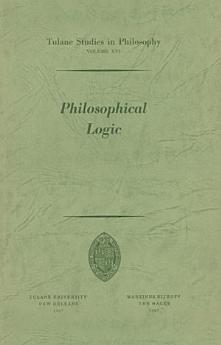Philosophical Logic
Robert L. Arrington · Peter M. Burkholder · Shannon Dubose · James W. Dye · James K. Feibleman · Bertrand P. Helm · Max Hocutt · Harold N. Lee · Louise N. Roberts · John C. Sallis · Donald H. Weiss
2012年12月 · Tulane Studies in Philosophy 第 16 冊 · Springer Science & Business Media
電子書
162
頁數
report評分和評論未經驗證 瞭解詳情
關於這本電子書
With this issue we initiate the policy of expanding the scope of Tulane Studies in Philosophy to include, in addition to the work of members of the department, contributions from philosophers who have earned advanced degrees from Tulane and who are now teaching in other colleges and universities. The Editor THE LOGIC OF OUR LANGUAGE ROBERT L. ARRINGTON Wittgenstein wrote in the Tractatus that "logic is not a body of doctrine, but a mirror-image of the world. " 1 In line with his suggestion that a proposition is a 'picture', Wittgenstein argued that propositions 'show' the logical structure of the real. He was insistent, however, that "the apparent logical form of a proposition need not be its real one. " 2 As a result of this we can misunderstand the structure of fact. Philosophical problems arise just when "the logic of our language is mis understood. " 3 It is common knowledge that much of this view of logic was rejected by Wittgenstein himself in the Philosophical Investi gations. There we are told that language has no ideal or sublime 4 logic which mirrors the structure of the extra-linguistic world. Consequently, inferences from the structure of language to the structure of that extra-linguistic world are invalid. Reality can be 'cut up' in any of a number of ways by language. Wittgenstein adopted a view of philosophy which would render that discipline a non-explanatory, non-critical study of the multiple ways in which language can be used.
關於作者
Born in New Orleans, Louisiana, in 1904, James Feibleman is a prolific author who has published nearly 50 books of poetry, novels, autobiography, but mostly serious philosophy. He attended the University of Virginia for several years, but did not graduate. From 1925 to 1929, Feibleman was the assistant manager of a department store. He then resumed his education in Europe during the 1930s. During World War II, Feibleman was a professor of English at Tulane University, later becoming chair of the department of philosophy from 1952 to 1969. His major endeavor was formulating a system of philosophy that rested on the ontological foundations of realism harking back to Plato the idea that there is an a priori argument for existence but that incorporated modern science. The outline of Feibleman's system was expounded in his massive Ontology (1951) but was elaborated in a number of volumes in special areas such as aesthetics, ethics, political philosophy, and legal philosophy. Feibleman also published several books on popular philosophy. In addition to his active career in philosophy, Feibleman was a successful businessman. From 1930 until 1954, he was vice president and general manager of James K. Feibleman Realty Company. He was a major partner in the Leopold Investment Company (1954-1971).
Donald H. Weiss, Ph.D., is president of Self-Management Communications, Inc. and has been a training and development executive and consultant for more than 30 years. In addition to consulting work, he has held management positions with Citicorp, Millers Mutual Insurance, and Equitable. He has many books include the first two editions of Fair, Square & Legal, Why Didn't I Say That?, Secrets of the Wild Goose, and The Self-Management Workshop: A Trainer's Guide. He lives in the St. Louis area.
為這本電子書評分
請分享你的寶貴意見。
閱讀資訊
智能手機和平板電腦
手提電腦和電腦
你可以使用電腦的網絡瀏覽器聆聽在 Google Play 上購買的有聲書。
電子書閱讀器及其他裝置
如要在 Kobo 等電子墨水裝置上閱覽書籍,你需要下載檔案並傳輸到你的裝置。請按照說明中心的詳細指示,將檔案傳輸到支援的電子書閱讀器。







